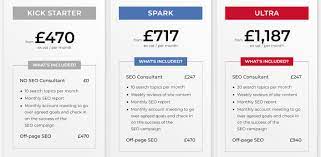The Cost of Search Engine Optimization: What You Need to Know
Search Engine Optimization (SEO) is a crucial aspect of any digital marketing strategy. It involves improving your website’s visibility in search engine results pages, driving organic traffic and increasing your online presence. However, one common question that arises when considering SEO is: How much does it cost?
Factors Influencing SEO Costs
The cost of SEO can vary significantly depending on various factors:
- Scope of Work: The extent of work required, such as on-page optimization, off-page link building, content creation, and technical SEO, will impact the overall cost.
- Competitiveness: The level of competition in your industry and the competitiveness of keywords you want to target can influence the cost. Highly competitive keywords may require more resources to rank for.
- Current Website Status: The condition of your current website in terms of design, structure, and content will determine the amount of work needed for optimization.
- Goals and Timeline: Your specific goals and the timeline within which you want to achieve them will also play a role in determining the cost. Short-term goals may require more intensive efforts.
Types of SEO Pricing Models
SEO agencies typically offer different pricing models to suit varying client needs:
- Monthly Retainer: Many agencies charge a monthly retainer fee based on the scope of work agreed upon. This model provides ongoing support and maintenance.
- Project-Based Pricing: For specific projects or one-time optimizations, some agencies may offer project-based pricing with a fixed cost for defined deliverables.
- Pricing Packages: Some agencies provide pre-packaged services with set prices based on the level of service required. These packages often cater to different business sizes or objectives.
Evaluating ROI in SEO Investment
While SEO costs can vary, it’s essential to consider the return on investment (ROI) that effective SEO can bring. Improved search engine rankings can lead to increased website traffic, higher conversion rates, and ultimately greater revenue for your business.
An investment in quality SEO services is an investment in the long-term success and growth of your online presence. By partnering with experienced professionals who understand your goals and target audience, you can achieve sustainable results that justify the cost incurred.
In Conclusion
The cost of search engine optimization is influenced by multiple factors such as scope of work, competitiveness, current website status, goals, and timeline. Understanding these factors and choosing a pricing model that aligns with your objectives is crucial for a successful SEO strategy.
If you’re considering investing in SEO for your business, remember that quality services come at a price but offer valuable returns in terms of improved visibility, traffic growth, and lead generation. Make an informed decision based on your budget and desired outcomes to maximise the benefits of SEO for your online presence.
Understanding the Costs of Search Engine Optimisation: 9 Frequently Asked Questions
- What factors influence the cost of search engine optimization?
- How does the competitiveness of keywords affect SEO costs?
- What is included in the scope of work for SEO services?
- Are there different pricing models for SEO agencies?
- What are the advantages of a monthly retainer fee for SEO services?
- How can I evaluate the ROI of investing in SEO?
- Is there a correlation between SEO investment and improved search engine rankings?
- What role does website status play in determining SEO costs?
- How can businesses determine an appropriate budget for SEO services?
What factors influence the cost of search engine optimization?
The cost of search engine optimization (SEO) is influenced by several key factors that play a significant role in determining the overall investment required for an effective SEO strategy. Factors such as the scope of work needed, including on-page and off-page optimisation, content creation, and technical SEO, can impact costs. Additionally, the competitiveness of keywords targeted, the current status of the website in terms of design and content, as well as specific goals and timelines set for achieving desired results all contribute to shaping the cost of SEO services. Understanding these influencing factors is crucial for businesses looking to invest in SEO and tailor their strategies to meet their objectives effectively.
How does the competitiveness of keywords affect SEO costs?
The competitiveness of keywords plays a significant role in influencing SEO costs. Keywords that are highly competitive, meaning they are sought after by many businesses and have a high search volume, often require more resources and effort to rank for. In competitive keyword landscapes, achieving top rankings demands a more comprehensive and strategic approach, including robust content creation, quality link building, and ongoing optimisation efforts. As a result, SEO campaigns targeting competitive keywords may incur higher costs due to the increased level of expertise, time investment, and resources needed to effectively compete in the online marketplace.
What is included in the scope of work for SEO services?
When considering the cost of search engine optimization services, it is crucial to understand what is included in the scope of work. SEO services typically encompass a range of tasks aimed at improving a website’s visibility and search engine rankings. This may involve on-page optimization, off-page link building, keyword research, content creation, technical SEO audits, and performance tracking. Additionally, SEO services may include competitor analysis, website structure improvements, and ongoing maintenance to ensure sustained results. By comprehensively addressing these aspects within the scope of work, SEO services aim to enhance a website’s online presence and drive organic traffic effectively.
Are there different pricing models for SEO agencies?
Yes, SEO agencies typically offer various pricing models to cater to the diverse needs of clients. Common pricing models include monthly retainers, project-based pricing, and pricing packages. With a monthly retainer model, clients pay a recurring fee based on the agreed-upon scope of work, providing ongoing support and maintenance. Project-based pricing involves a fixed cost for specific projects or one-time optimizations. Additionally, some agencies offer pricing packages with set prices based on the level of service required, often tailored to different business sizes or objectives. These different pricing models enable clients to choose the option that best aligns with their budget and goals when engaging with an SEO agency.
What are the advantages of a monthly retainer fee for SEO services?
Opting for a monthly retainer fee for SEO services offers several advantages for businesses seeking ongoing support in their digital marketing efforts. One key benefit is the consistency and predictability it provides in budgeting, allowing businesses to allocate a fixed amount each month for SEO services. This arrangement fosters a long-term partnership with an SEO agency, enabling continuous monitoring, adjustments, and improvements to the SEO strategy based on evolving trends and performance metrics. Additionally, a monthly retainer fee often includes regular reporting and communication, ensuring transparency and alignment between the business goals and the SEO activities being carried out. Overall, the stability and flexibility offered by a monthly retainer fee can lead to sustained organic growth in search engine rankings and online visibility over time.
How can I evaluate the ROI of investing in SEO?
When considering the investment in Search Engine Optimization (SEO) and evaluating its Return on Investment (ROI), it is essential to look beyond immediate results and consider the long-term benefits. By tracking key performance indicators such as organic traffic growth, keyword rankings, conversion rates, and revenue generated from organic search, businesses can measure the impact of SEO efforts on their bottom line. Additionally, analysing customer engagement metrics, such as time spent on site and bounce rates, can provide insights into the effectiveness of SEO strategies in attracting and retaining website visitors. Ultimately, a comprehensive evaluation of ROI in SEO involves assessing both quantitative data and qualitative outcomes to determine the value that SEO brings to your online presence and overall business success.
Is there a correlation between SEO investment and improved search engine rankings?
When considering the cost of search engine optimization (SEO), a common question that arises is whether there is a correlation between SEO investment and improved search engine rankings. The answer is a resounding yes. Investing in quality SEO services can significantly impact your website’s search engine rankings. By implementing strategic optimizations, enhancing content relevance, building authoritative backlinks, and improving technical aspects of your site, you can boost your visibility in search results. While the direct correlation may vary based on factors like competitiveness and algorithm changes, a well-planned SEO investment often leads to improved rankings over time, driving organic traffic and ultimately enhancing your online presence.
What role does website status play in determining SEO costs?
The current status of a website plays a significant role in determining SEO costs. Websites that are well-designed, structurally sound, and rich in quality content may require less initial work to optimise compared to sites with technical issues, poor user experience, or outdated content. Addressing existing website issues and ensuring it meets SEO best practices can impact the overall cost of SEO services. A thorough assessment of the website’s status is essential for SEO professionals to develop a tailored strategy that aligns with the site’s needs and maximises its potential for improved search engine rankings and organic traffic growth.
How can businesses determine an appropriate budget for SEO services?
Determining an appropriate budget for SEO services is a critical decision for businesses looking to enhance their online visibility and drive organic traffic. To establish a suitable budget, businesses should first consider their specific goals, such as increasing website traffic, improving search engine rankings, or boosting conversions. Assessing the competitiveness of their industry and target keywords can also help in estimating the level of investment required. Additionally, evaluating the current state of their website and identifying areas that need improvement will guide businesses in setting realistic budget expectations for SEO services. By aligning their budget with achievable objectives and seeking guidance from experienced professionals, businesses can allocate resources effectively to maximise the impact of their SEO investment.




